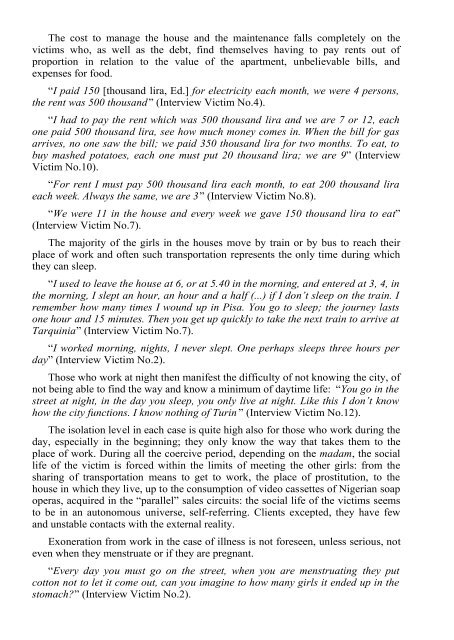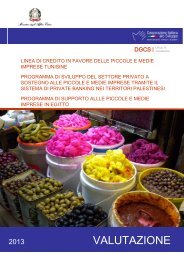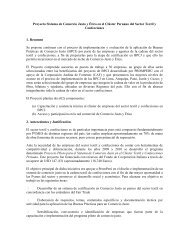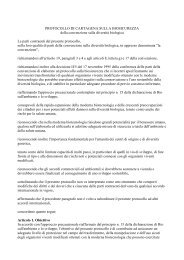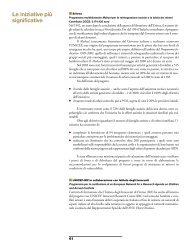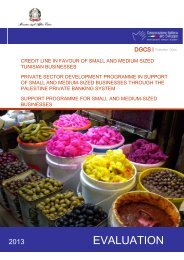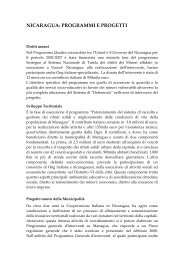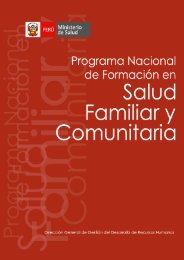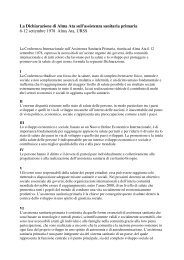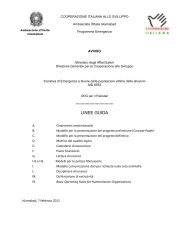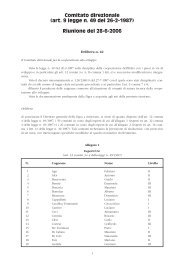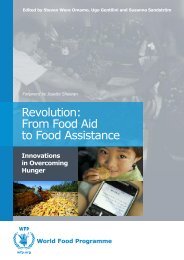The cost to manage the house and the maintenance falls completely on thevictims who, as well as the debt, find themselves having to pay rents out ofproportion in relation to the value of the apartment, unbelievable bills, andexpenses for food.“I paid 150 [thousand lira, Ed.] for electricity each month, we were 4 persons,the rent was 500 thousand” (Interview Victim No.4).“I had to pay the rent which was 500 thousand lira and we are 7 or 12, eachone paid 500 thousand lira, see how much money comes in. When the bill for gasarrives, no one saw the bill; we paid 350 thousand lira for two months. To eat, tobuy mashed potatoes, each one must put 20 thousand lira; we are 9” (InterviewVictim No.10).“For rent I must pay 500 thousand lira each month, to eat 200 thousand liraeach week. Always the same, we are 3” (Interview Victim No.8).“We were 11 in the house and every week we gave 150 thousand lira to eat”(Interview Victim No.7).The majority of the girls in the houses move by train or by bus to reach theirplace of work and often such transportation represents the only time during whichthey can sleep.“I used to leave the house at 6, or at 5.40 in the morning, and entered at 3, 4, inthe morning, I slept an hour, an hour and a half (...) if I don’t sleep on the train. Iremember how many times I wound up in Pisa. You go to sleep; the journey lastsone hour and 15 minutes. Then you get up quickly to take the next train to arrive atTarquinia” (Interview Victim No.7).“I worked morning, nights, I never slept. One perhaps sleeps three hours perday” (Interview Victim No.2).Those who work at night then manifest the difficulty of not knowing the city, ofnot being able to find the way and know a minimum of daytime life: “You go in thestreet at night, in the day you sleep, you only live at night. Like this I don’t knowhow the city functions. I know nothing of Turin ” (Interview Victim No.12).The isolation level in each case is quite high also for those who work during theday, especially in the beginning; they only know the way that takes them to theplace of work. During all the coercive period, depending on the madam, the sociallife of the victim is forced within the limits of meeting the other girls: from thesharing of transportation means to get to work, the place of prostitution, to thehouse in which they live, up to the consumption of video cassettes of Nigerian soapoperas, acquired in the “parallel” sales circuits: the social life of the victims seemsto be in an autonomous universe, self-referring. Clients excepted, they have fewand unstable contacts with the external reality.Exoneration from work in the case of illness is not foreseen, unless serious, noteven when they menstruate or if they are pregnant.“Every day you must go on the street, when you are menstruating they putcotton not to let it come out, can you imagine to how many girls it ended up in thestomach?” (Interview Victim No.2).
If the woman is pregnant in most cases she is made to abort and for that theyask another 1,500 Euros (if the pregnancy is already in the fourth month it becomes2,500) to add to the debt and the other expenses 34 .From many testimonies emerges the weight at the psychological as well asphysical level, to put up with for a year or two (this is the average duration for thepayment of the debt) a style of life which foresees about 15, 20 sexual intercoursesper day with people unknown, often violent or of whom they are afraid.The constant fear is to find themselves faced with danger for their safety, whichconstitutes another element of discomfort: many girls say that each time they goout they do not know what could happen to them. They are frightened of beingkilled, hit, or of becoming ill.According to the opinion of several privileged witnesses, in the relationshipwith the clients, physical and moral violence is not rare, often accentuated, in thecase of the Nigerian victims, of attitudes and requests for “extreme” sexualpractices that visibly betray the sense of a perceived cultural superiority, if notracial, on the part of many Italian men.In this sense the testimony of an operator from Castelvolturno is emblematic:the social fibre is severely degraded on the coast area of the north of Naples w<strong>here</strong>the daily context of sexual relations is characterised by physical violence and moraloppressionThe Law Enforcement officers also register multiple violence by the clients, inparticular to the damage of the Nigerian women “A group attacked her andtortured her with the neck of a broken bottle ” (Questura of Venice).It is difficult to say if the Nigerian women put up with more violence incomparison with those from other ethnic groups, but their clients are often thosefrom the edge:“Nigerian prostitution is directed towards the low end of the market (…) it issymptomatic of the fact that they are in the suburbs, they have lower chargest<strong>here</strong>fore even the clients belong to the lower end of the customers” (Corpo deiCarabinieri - Rome).To make a precise complaint against the authors of the violence undergone isoften very difficult: if, as nearly always happens, the attacker is Italian or howevera white, the woman has nearly always difficulty in reconstructing a preciseidentikit, because in her eyes the somatic lines of whites are hardly distinguishable.Risks of violence derive sometimes from problems with other organisations forthe management of the territory, problems that are “sorted out” putting pressure onthe same girls, as is evident from the testimony which follows:“Then I had a problem t<strong>here</strong>. Six months had passed when an Albanian arrivedwho told me «get out of <strong>here</strong>». I went to the house and I said that I had been told togo away, and that I was afraid of the Albanians. She said: «This is my place and34Faced with these situations, it appears evident how important is the aid provided by those organisationsthat operate in health protection and harm reduction, and that can sustain the women to access and benefitfrom the social health services of the territory.
- Page 1:
TRAFFICKINGOF NIGERIAN GIRLSTO ITAL
- Page 5 and 6:
F O R E W O R D1. Objectives and st
- Page 7 and 8:
and who have identified the most si
- Page 9 and 10:
on the other hand, for those involv
- Page 11:
Case files analysed: Preventive det
- Page 15 and 16:
Table 2 - Socio-economic situation
- Page 17 and 18:
Table 3 - Nigerian citizens regular
- Page 19 and 20:
Table 5 - Social protection permiss
- Page 21 and 22:
Table 7 - Number of persons charged
- Page 23 and 24:
Table 8 - Detainee population sub-d
- Page 25 and 26: and the United States enables this
- Page 27 and 28: C H A P T E R IW a y s a n d p h a
- Page 29 and 30: Figure No.2 - Edo State.It is not c
- Page 31 and 32: Nigeria. From 1996 in Benin City an
- Page 33 and 34: In this variegated framework, the d
- Page 36: “Benin City is one of those State
- Page 39 and 40: Various privileged witnesses of the
- Page 41 and 42: In the first years of the traffic o
- Page 43 and 44: pay considerable sums for lodging,
- Page 45 and 46: The routesWe find at least three ty
- Page 47 and 48: Figure No.5 - Trafficking routes th
- Page 49 and 50: The journey overland through Africa
- Page 51 and 52: new dispositions and contacts to co
- Page 53 and 54: Then he sends her in a taxi to the
- Page 55 and 56: T. remains in this house for 21 day
- Page 57 and 58: detainees go towards the refectory,
- Page 59 and 60: At this point the organisation esco
- Page 61 and 62: was accepted by the Ivory Coast pol
- Page 63 and 64: B.E. «Yes, I was given a Ghanaian
- Page 65 and 66: Now the documents are “hired”:
- Page 67 and 68: It is understood however that the v
- Page 69 and 70: “There is no Nigerian passport wh
- Page 72 and 73: C H A P T E R I VL i v i n g a n d
- Page 74 and 75: have no shop and then there is no p
- Page 78 and 79: mine since a long time, he can’t
- Page 80 and 81: A feminine managementIn analysing t
- Page 82 and 83: “There are many pimps that when y
- Page 84 and 85: The control of movementThe fact tha
- Page 86 and 87: Physical punishments can be made by
- Page 88 and 89: Control between psychological subje
- Page 90 and 91: arms), tortured in many different f
- Page 92 and 93: C H A P T E R VT h e o r g a n i s
- Page 94 and 95: Each penal procedure on the subject
- Page 96 and 97: Often it is the same madam who move
- Page 98 and 99: Even in numerous recent criminal pr
- Page 100 and 101: work arrangements (…) persons tha
- Page 102 and 103: man all the money she had in the ho
- Page 104 and 105: in the plates and everything and th
- Page 106 and 107: exploitation) has reached an amount
- Page 108 and 109: C H A P T E R V IT h e e n d o f t
- Page 110 and 111: A: «You have to bring me a present
- Page 112 and 113: Often the family is however not abl
- Page 114 and 115: the different evaluations of the as
- Page 116 and 117: The discussions on the possibility
- Page 118 and 119: eal results: to distance herself fr
- Page 120 and 121: of a different culture is very impo
- Page 122 and 123: C H A P T E R V I IC o n s i d e r
- Page 124 and 125: In the case of the girls having mor
- Page 126 and 127:
As has been many times noted, the c
- Page 128 and 129:
under the profile of the “quality
- Page 130 and 131:
person to obtain either relevant re
- Page 132 and 133:
Numerous are the criminal juridical
- Page 134 and 135:
If the accused claims to not knowin
- Page 136 and 137:
sanctions, sometimes, also in prese
- Page 138 and 139:
d) Investigative and judiciary co-o
- Page 140 and 141:
The reform foresees, under Art. 1,
- Page 142 and 143:
which the woman can definitively tu
- Page 144 and 145:
witnesses, social operators - agree
- Page 146:
and necessary, therefore, to think
- Page 149 and 150:
in many cases they are driven to th
- Page 151 and 152:
Melossi, D., (2002), “Le teorie s


